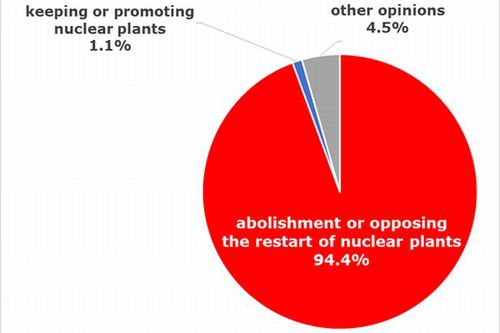December 23, 2014
90% of Public Comments on Strategic Energy Plan Call For 'Nuclear-Free Japan'
Keywords: Energy Policy

Breakdown of Public Comments to the Strategic Energy Plan
Collected from December 6, 2013 to January 6, 2014
Data from Asahi Shimbun
Graph by Japan for Sustainability
On April 11, 2014, the Cabinet of Japan approved a national Strategic Energy Plan in which nuclear energy is determined to be an "important base-load electricity source." Prior to this Cabinet decision, the Ministry of Economy, Trade and Industry (METI) called for public comments on the proposal. The public had one month from December 6, 2013, to submit their opinions on the plan. The results showed that the majority of opinions called for a nuclear-free Japan either by advocating for the decommissioning of reactors or by opposing the restart of nuclear power plants.
The Asahi Shimbun later published an article on November 12, 2014, stating that 94% of public comments received on the new Strategic Energy Plan called for a "nuclear-free society," whereas only 1% were in favor of "maintaining or further promoting nuclear energy."
Let's rewind for a moment to the summer of 2012, when the then-ruling Democratic Party of Japan led by Yoshihiko Noda gathered public comments and held public hearings in several locations to encourage a national discussion on the desired level of nuclear reliance in the 2030s. Of the approximately 89,000 public comments received, 87% supported the Zero Scenario (zero nuclear power by 2030). The Noda Cabinet also referred to the results of public hearings and opinion polls conducted by the media, concluding that the majority of the public was calling for a nuclear-independent society. A policy was established to halt the operation of nuclear power plants by sometime in the 2030s in an effort to more closely align political policy with public opinion.
But after Shinzo Abe took office and formed a coalition government between the Liberal Democratic Party and Komeito Party, METI issued a draft Strategic Energy Plan in which nuclear power was described as an "important base-load electricity source." According to METI's announcement in February 2014, around 19,000 public comments were received. But while the Ministry disclosed some of the major comments, it did not provide the percentages of yeas and nays--the crux of the public debate on nuclear power plants. Mr. Toshimitsu Mogi, Minister of METI at the time, explained in the Diet that the comments were analyzed "not on the basis of numbers (of for or against) but on contents."
This led one Asahi Shimbun journalist to take on what the government had neglected: to find out the yes-no ratio himself. He requested that METI disclose every single comment it received and obtained, at his own expense of over 200,000 yen (about U.S.$1,850), a copy of all 20,929 pages of comments, which, if piled up, would have been over one meter in height.
It took him about two months, while doing his regular work, to read them all, marking a circle on "yes" comments and an x on "no"s. The total number of comments turned out to be 18,711, counting comments that were multiple pages long as one. All told, he counted 17,665 noes--94.4% of all comments--asking for abolishment or opposing the restart of nuclear plants. Meanwhile, 213 comments, or 1.1%, supported keeping or promoting nuclear plants, and 833 expressed other opinions, making up 4.5%. As predicted, the overwhelming majority of public comments were against nuclear power plants!
A survey conducted by the Asahi Shimbun in late October showed that 29% supported the Abe administration's planned restart of nuclear plants, a smaller percentage than the 55% who said no. The newspaper has taken the same survey nine times since June 2013, coming up with the same trend again and again.
"I went through all of the comments essentially by myself. METI could have done it in a week. It just proves that the government did not want the ratio to come out," commented the journalist. "The Strategic Energy Plan which, again, calls for nuclear power as a key energy source, and the actions the government is taking to restart nuclear plants are out of touch with public opinion. At least I am glad that I brought these numbers--94% "no" and 1% "yes"--to light."
Public comments, of course, do not represent 100% of public opinion. But the difference between 94% and 1% is far from negligible. The current administration, which has all the intention of promoting nuclear power plants without ever revealing the yes-no numbers of public comments will no doubt fail our trust and our future.
There are many, many people in the world who are paying close attention to (or worrying about) the current state of Fukushima and Japan's energy policy. Even though our government is promoting nuclear plants, I want the world to know that a meager 1% of public comments are in favor of the government's plans, and that 94% demand no nuclear power.
Junko Edahiro
Related
"JFS Newsletter"
- Shaping Japan's Energy toward 2050 Participating in the Round Table for Studying Energy Situations
- Implementation of the Paris Climate Agreement: A Report on Japan's Round Table for Studying Energy Situations
- Renewable Energy Hopes and Hurdles Amid Full Liberalization of Japan's Electricity Market
- Shimokawa Town, Hokkaido: Establishing an Energy-Sustainable Small Town Management Model with Local Forest Resources (Part 2)
- Shimokawa Town, Hokkaido: Establishing an Energy-Sustainable Small Town Management Model with Local Forest Resources (Part 1)


